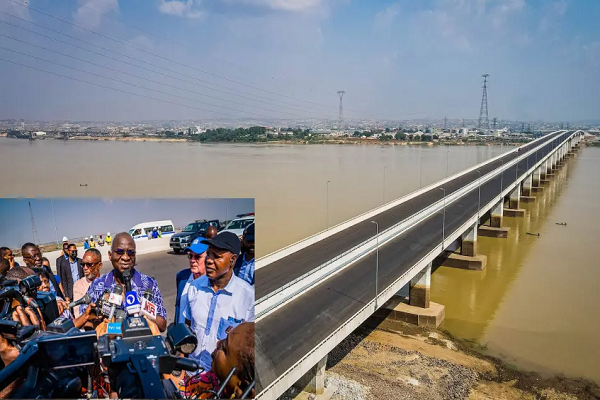WORKS and Housing Minister Babatunde Fashola yesterday blamed the delay in the completion of the Second Niger Bridge on the activities of the Indigenous People of Biafra (IPOB).

The minister said the Monday sit-at-home directive of the separatist group prevented the contractor handling the project to work for days in the past two years.
Fashola said the project, earlier scheduled for inauguration in October 2022, may now be completed between April and May
The former Lagos governor explained that the bridge itself and the road linking it to the Obusi-end on the Anambra side had been completed.
But the interchange is at different levels of completion, while the road linking the bridge to the Asaba side is still under construction.
He said: “These dates keep shifting and people must remember that on the eastern side, our contractors have not been able to work on Mondays for almost two years and that has affected the completion date.”
According to him, the deployment of workers on Saturdays by the contractor cannot make made up for the 52 days (yearly) they could not work on site.
The minister further asserted that certain other challenges like relocating transmission lines connecting the East to the West across the Niger River contributed to days lost and added to the snag that affected the early completion of the bridge within the time earlier stipulated.
Speaking on finishing the last four-kilometre stretch of the road in four months, Mr. Fashola said the construction is taking place in marshy land and as such, there is a great need for dredging and sand filling, a process which he said cannot be rushed.
He emphasized that the ministry and its contractors have made great progress on the road so far because they use Prefabricated Vertical Drains which accelerate settlement and drainage and as such, workers can start building quicker than would ordinarily have been expected.
The minister said the road which was temporarily opened on December 15 for the Yuletide, will be kept open till January 1st, 2023 for those travelling to the East from the West.
He said on January 2, the traffic on the bridge would be reversed to enable travellers returning from the East to West to make use of the road from January 3 to January 15 when it would be shut again.
The minister added that inevitably, the bridge would be tolled to ensure that it is maintained to serve Nigerians for many years.
Fashola said: “Inevitably, the bridge will be tolled. That is the job of the Nigeria Sovereign Investment Authority (NSIA) because part of what we are looking at is that we have a bridge that is properly maintained.
“So, this is where private sector capacity becomes useful. They may not be able to mobilise the capital to buy the asset but they are able to mobilise the expertise and efficiency to operate it, of course not without some due diligence being done.
“That was my experience in Lagos when we did the Lekki Bridge. The government built the bridge, but we contracted a private sector operator to manage the operation and collection of the toll.
“My responsibility is to deliver the asset. Government as the owner will then decide how it wants it to be concessioned, and under what terms and conditions.”
Fashola also appealed to the public to bear the pains resulting from the inconveniences created by on-going construction on major highways across the country.
He noted that most of the side roads that feed onto the main arterial roads are either state or local government roads.
According to him, one of the things the Federal Executive Council (FEC) will consider is an “old road” to serve as an alternative route.
“Hopefully, if we get there, I think that will be one option. We mean no harm. The last six-kilometre into Lagos on the Lagos-Ibadan Expressway, we deliberately left for the last because we knew it was going to be the most difficult to build because of the traffic, the density, and the human activity there.
“So, whilst places like the Second Niger Bridge and Bodo-Bonny Road, which are virgin projects, seem to be moving quite quickly, building through Abuja-Kano, Lagos-Ibadan, Ikorodu-Sagamu or Kano-Maiduguri that are trafficked every day have different logistic challenges.”

